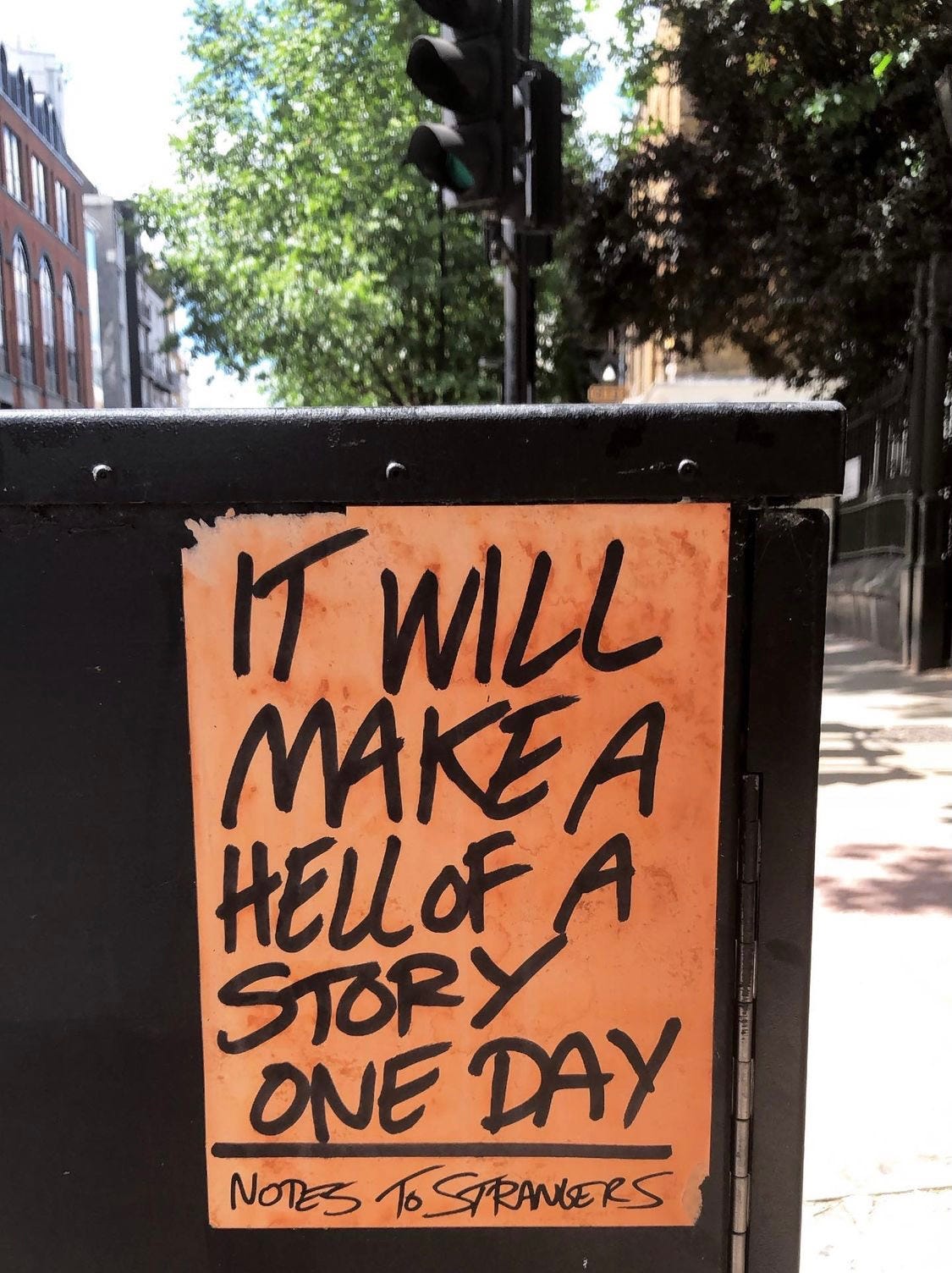How do you justify your life?
By which I mean, how do you live with it?
I’ve realized more and more lately how deeply I view my life as a story. I like to imagine the major events of my life, both good and bad, as I might embellish them when I’m 80, and maybe childless,1 and lying about my age to some nice young man. We’re both lounging in the shade beside the sea in southern France, drinking gin & tonics. I’m wearing a big floppy hat and white cat-eye sunglasses. I regale him with tales of my wild and spirited youth, and I agree to sign his worn copy of my magnum opus only if he promises not to gossip (but I hope he will). And the next day, this time over escargot and champagne, it’s another young ear, another old story. And the next day. And the next.
(Yes, I have stolen this vision of my future from the lyrics of A Lady of a Certain Age by The Divine Comedy. I must protest that my vision is much happier.)
Falling in love, or getting my heart broken. Studying in London and then living through a pandemonium. Even fainting in a bar, hitting my head, and causing a rumor to fly around my college campus that someone got stabbed.2
They’re all just another plot development, endless inciting incidents and climaxes and falling actions and resolutions on top of each other, interweaving, transforming in function from pieces of a secondary plot to a primary one as the story goes on. Every victory and every failure, every transformative realization or night spent in tears. Everything foreshadows a twist, or explains a frustrating but surmountable setback, or leads to that holy grail of plot: character development.
All of it means something, because when I retell it later, it must coalesce into something like a theme. Or else what was it all for?

In this way, every day, I’m reading my own life.
Wondering, how will this storyline tie off? What will it mean for me, my character? This success surely can’t last; when is the next plot snare coming?
Or I’m exulting: this experience is once-in-a-lifetime, full of awe and intrigue; it enriches the overarching narrative tenfold. Or, of course, assuring myself: though painful now, this experience gives the narrative emotional depth, a sense of tension and stakes.
Mostly I just complain: this narrative sucks. Who’s writing this shit?3
But there are no loose ends in this story. So when my life really is the worst book I’ve ever read, I can hope that it won’t always be; this chapter will end, and another will begin.
This incredibly maladjusted way of processing my life ties in very nicely with my intense fear of sudden and tragic death. It won’t happen, because the story just can’t end like that.
Unless I’m living in Game of Thrones, which I know I am not, because no matter what my life is told much better.
Other things my life is not:
Fleabag. Too short.
Dark. Almost too thematically complex. And German.
Pride and Prejudice. Not enough sex.
Things my life does resemble:
The Simpsons. Goes on forever.
Supernatural. Just won’t die. (Well, it’s dead now after 15 years, but it went out with a bang.)
The U2 album that Apple pushed to everyone’s phones in 2014. Sassy, funny, bold, and unexpected. A story in and of itself.
Some storylines in my life now are drawing to a close, and their endings I know will be a relief or a devastation; but either way, others will begin as soon as those end. It’s high time that my seemingly endless job search, for example, resolves itself. We are all sick of that storyline.4 Still, maybe one day after a satisfying day at work, I’ll look back and notice an underlying theme, or else be grateful for the characterization.
But I have to be honest with you now. Mostly, I said all of this just so I could take a dig at this author who criticized readers for rating her book 4.5 stars.
I rate my own life, like, a 3.1. It’s great. And I can always embellish later, by the sea in southern France.
—Alexa
Self-referential, like all good literature.
Iykyk.
The age-old question, innit.
But I shan’t stop mentioning it until someone takes pity on me.



